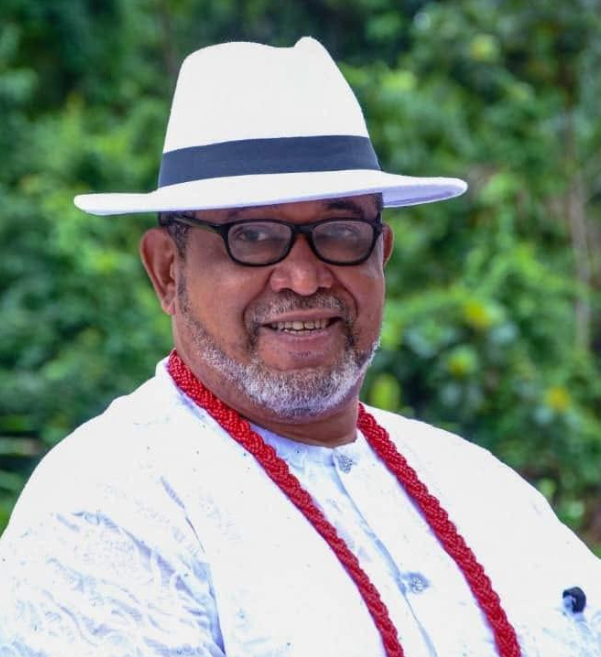
When Glitz Meets Grace: Patrick Doyle Sparks Debate Over Two High-Profile Nigerian Weddings in US and Europe

Veteran broadcaster and actor, Patrick Doyle, has once again stirred conversations on social media after penning a thought-provoking piece on two high-profile Nigerian weddings that recently took place abroad, one in the United States and the other in Europe. In his signature style, Doyle dissected the stark differences between the two celebrations, describing one as a gaudy carnival filled with a “motley crowd” of both the famous and infamous, while portraying the other as the very definition of quiet sophistication and class. His observations have now ignited a firestorm of commentary among Nigerians online, raising old questions about culture, identity, and the ever-controversial Nigerian love for flamboyance.
According to Doyle, the two weddings, which happened almost simultaneously, presented the world with contrasting images of Nigeria. On one hand, there was a flamboyant show of wealth and extravagance where the crowd appeared larger than life, blending socialites, celebrities, politicians, and controversial figures in what he referred to as a carnival-like gathering. It was loud, flashy, and in many ways the stereotypical portrayal of how Nigerian events are often perceived — colorful, excessive, and unapologetically dramatic. On the other hand, there was a more refined ceremony overseas that exuded grace and poise, attended by a carefully selected guest list of dignified and accomplished personalities. No noise, no chaotic fanfare, no unnecessary drama — just an exhibition of taste, elegance, and discretion.
“This is the picture of Nigeria that the world is coming to terms with,” Doyle wrote. “We are at once razz and loud while also possessing the ability to switch on the charm of sophistication and style. I swear, I love Nigeria and being a Nigerian.”
His words struck a chord, and as expected, social media quickly lit up with hot takes. Some Nigerians agreed wholeheartedly, praising him for boldly pointing out the duality of Nigerian society. Others felt his words were a subtle shade at one of the weddings, suspecting that Doyle was indirectly comparing certain celebrity-studded nuptials to the more private, exclusive one. While he did not mention names, the timing and locations of the events have fueled endless speculation, with many guessing the couples in question.
The truth, however, is that Doyle’s commentary reflects a reality that has long defined Nigeria’s global image. Nigerians are known for big, extravagant celebrations — weddings that could easily rival movie productions, with opulent décor, fashion statements worth millions, fleets of exotic cars, and menus that could feed a village. These parties, often tagged “owambe,” have put Nigeria on the map as a nation of joy, wealth, and excess. At the same time, there exists a growing class of Nigerians who prefer subtlety over noise, people who embody sophistication and believe that true wealth and class are best displayed in restraint rather than flamboyance.
The duality that Doyle highlighted has always been there, and it is perhaps what makes Nigerian culture so fascinating. One can attend a wedding in Lagos where the dance floor is flooded with naira notes raining down like confetti, and the very next week witness another wedding in London or Paris where the music is soft jazz, the guest list is capped at 200, and the décor whispers elegance instead of screaming luxury. Both are Nigerian, both are valid expressions of culture, yet they stand on opposite ends of the spectrum.
For some Nigerians reacting online, Doyle’s post was not just about weddings but about the country’s identity as a whole. “We are a paradox,” one user wrote. “Loud but classy, chaotic but graceful, rough on the outside yet refined on the inside. That is who we are, and maybe that’s our strength.” Others, however, argued that there is nothing wrong with being loud and flamboyant, as long as one can afford it. “Why should we always tone down for the sake of the West?” a commenter asked. “If we want to celebrate like it’s a carnival, let us be. That’s our culture.”
The debate has also sparked conversations about what true class means in Nigerian society. Is it in the size of the guest list or the pedigree of the attendees? Is it in the money sprayed on the dance floor or the quiet exclusivity of a small gathering? For years, the Nigerian elite have battled with the perception that money is often mistaken for class. Doyle’s post seems to have reawakened that discussion, reminding people that sophistication cannot always be bought — it is often a reflection of taste, upbringing, and values.
Interestingly, some fans of Doyle suggested that his admiration for the “quiet sophistication” of one wedding reveals a generational difference. Younger Nigerians, particularly millennials and Gen Z, are more inclined towards loud, social-media-driven celebrations, often organizing events that trend on Instagram and TikTok for weeks. Older Nigerians, on the other hand, are more likely to appreciate exclusivity, viewing privacy as the ultimate luxury. Perhaps Doyle’s take is less about shading anyone and more about revealing the changing cultural dynamics between generations.
Whatever the case may be, one cannot deny that Nigerian weddings, whether loud or quiet, have become global spectacles. From Dubai to Paris, Houston to London, Nigerians continue to export their unique style of celebration abroad, turning every event into a statement of identity. Even foreigners now look forward to being invited to Nigerian weddings, whether it is the carnival-style “owambe” or the minimalist classy event. What Doyle’s post has done is remind us that both sides of this spectrum are still authentically Nigerian, and together they paint a full picture of who we are as a people.
As the conversation rages online, one thing remains clear: Nigerians love weddings, and weddings will always be more than just unions of two people — they are cultural showcases, family reunions, social networking hubs, and often, soft power diplomacy. Patrick Doyle may have only shared an observation, but in doing so, he has once again highlighted the complex beauty of being Nigerian, a people who can be both razz and regal at the same time.
Whether one prefers the carnival or the sophistication, there is no denying that Nigerian weddings remain unmatched in energy, creativity, and impact. And as long as Nigerians continue to celebrate love across the globe, the world will keep watching — sometimes in awe, sometimes in confusion, but always with fascination.


